Link:
https://dannyman.toldme.com/2011/03/01/flooded/

My commute was nice this morning, until . . .
Near the end of the bicycle version of my commute I ride along a creek. I could tell from Stephen’s Creek that the water was high, so when I rode the ramp down to this underpass I wasn’t surprised. I took my bicycle around this water, through especially sticky mud that threatened to suck off my shoes, and which globbed on to my bicycle, smeared on my pants.
2 Comments
Link:
https://dannyman.toldme.com/2011/02/25/pop-chips-defy-my-magic-ass/

These potato chips did not succumb to my magic ass.
I was tipped off that a bag of potato chips was hanging loose in the vending machine. I wasn’t desiring potato chips, but I felt obliged anyway to whap my butt against the side of the vending machine to see if I might dislodge them and therefor acquire one of my favorite cuisines: free food! Many a time in college I procured errant candy bars from the vending machines in the Digital Computing Laboratory building by wielding what I refer to as my magic ass.
Alas, my magic ass did not succeed this time. “Dude, just put in 75 cents, you’ll get two,” suggested a coworker.
“But I don’t want BBQ potato chips. I’m only interested in dislodging free food!”
I did buy a Snickers bar, just because, but it is still in my backpack, uneaten. I’ll wash it down with a coffee at some point.
Feedback Welcome
Link:
https://dannyman.toldme.com/2011/02/24/half-a-baby/

A bloated plate burrito, al pastor on the inside, parmesan cheese atop, at Taqueria San Bruno.
I have fallen off the bandwagon of late, but now that I have freed up some time I’m fixing to retroactively post photos. I make up my own rules.
I visited my team in the San Bruno office on Thursday. We grabbed Taqueria San Bruno, and it was good. The food came out slow so my coworker and I downed two bottles of Mexican Coke each. What is Mexican Coke? Coke from Mexico, made with cane sugar. The other coke we get from Mexico I think mostly originates in Columbia, and that is not my preferred formulation.
Feedback Welcome
Link:
https://dannyman.toldme.com/2011/02/22/city-hall-station/
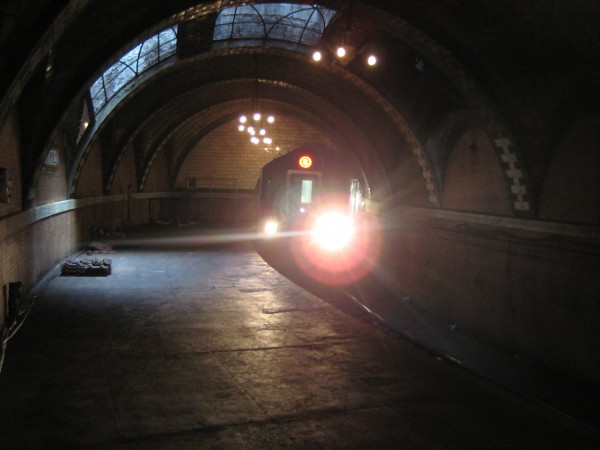
A 6 train pulls through the loop at the abandoned City Hall subway station.
Back in May I joined a New York Transit Museum tour of the abandoned City Hall station. This was the original Southern terminus of the Lexington Ave line, built on the loop underneath City Hall where trains would turn around and head back North. It was abandoned before long for several reasons, including the proximity of the Express station built at nearby Chambers St when the system was expanded, and also because when the trains moved to having middle doors, the gap on the curved platform became all the more dangerous. Lastly, it is impossible to lengthen this curving station to accommodate the longer trains run on the contemporary New York subway.
There was a plan to move the New York Transit Museum here, but folks became skittish of opening a subway museum beneath City Hall after 9/11.
You can get a quick glimpse of the station by hopping on a southbound Lexington local train at Chambers St. Our tour began at Chambers St, where we boarded the front car of a train ready to enter the loop and were dropped off by MTA staff at the station to take pictures. It was a bit dark for my camera, it is more compelling as a legend than it is in person.
Update: A very similar photo take in 1903.
Feedback Welcome
Link:
https://dannyman.toldme.com/2011/02/21/adorable-panhandler/
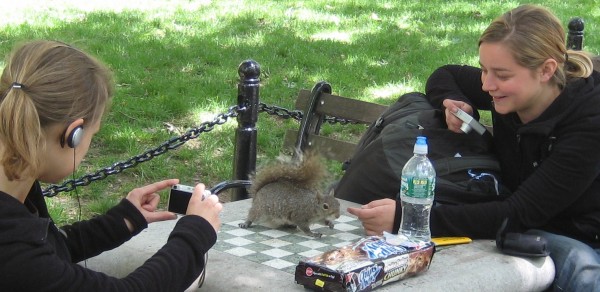
We all gotta eat!
New York City is full of hustlers. Some prey on tourists. Here, a tree-dwelling Manhattanite offers two backpacker girls some novel photographs and an adorable memory, in exchange for cookies. Of course, a shrewd Brooklynite like myself is not above taking quick advantage of the situation for his own cute photograph, but then the squirrels and I have an understanding.
Feedback Welcome
Link:
https://dannyman.toldme.com/2011/02/15/valentine-pie/

For Valentine's Day, Mei baked me an apple pie.
I made pork chops, Mei baked an apple pie. A nice pairing.
Feedback Welcome
Link:
https://dannyman.toldme.com/2011/02/08/comcast-hijinks/
So, one of my peeves is companies that charge new customers a lower rate, and then raise the rate after you have had them for a while. I think it is really weird that loyal customers are charged more than new customers. For example, I signed up for basic cable service with Comcast at $60/mo, but paid the introductory rate of $30/mo, which is about the most I’m inclined to pay for monthly television. (And I’m only willing to pay that much because I prefer to live with someone who likes TV.)
Anyway, my rate recently went up to, as best I can tell: $45/mo for the next six months, after which it will go up to $60/mo. “Homie don’t play dat.” So I called them and explained that I was only going to pay them $30/mo, either through them or DirecTV, which both offer new customers $30/mo. They transferred me to some other lady that said that it was $45/mo or bust unless I wanted the cheaper $30/mo package but no more Bravo. I said I’d check with my sweetheart and the lady on the phone said “okay, $30 package for you.”
Not sure if we have Bravo or not, I looked online. Aside from pirating shows, which is inconvenient for the non-techy sweetheart and the old analog television, Amazon.com offers “Top Chef” and “Project Runway” which is what we watch on Bravo, for $2/episode. If both shows are running then we’d pay $16 in a month, otherwise . . . ah and yes, Amazon on-demand service pipes straight through the TiVo: no technical expertise or computer connections required!
So, I think I’m paying Comcast $30/mo now, and if I don’t have Bravo then I’m purchasing shows a la carte. Vivé consumer empowerment!
Update: Comcast got in touch with me due to this post, and switched me back to the six-month $30 rate that includes Bravo. Thanks, Comcast! I guess I’ll have to blog about this again in August.
2 Comments
Link:
https://dannyman.toldme.com/2011/02/08/rookie-mistakes/
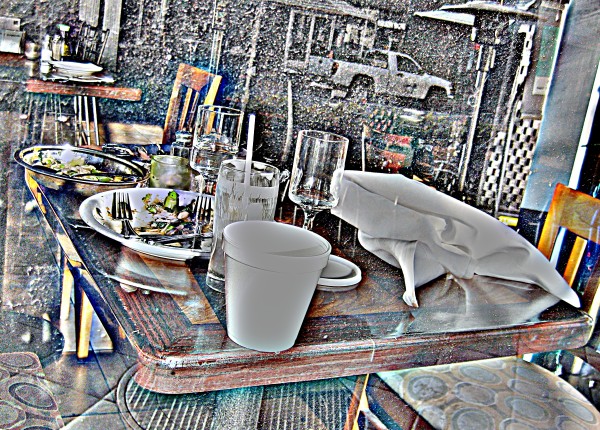
Walking to work Monday morning I passed a restaurant on Castro St that was closed. In their front window was this table of half-eaten food. That is a failure on multiple levels: you’re supposed to clean up at night: wipe down the tables, sweep, mop: multiple passes through the dining room. And if you’re going to somehow manage to not bus and clean a table, you shouldn’t miss the table in the front window.
I won’t name names, but I’ll note that they have 2.5 stars on Yelp. I tried to leave them a message through the contact form on their web site, but the contact form is broken too, so I left the message via an identical form at their web design firm, with the advice that they fix their client’s contact form and pass my message along.
Meanwhile, I was frustrated with my own photo. I can live with the glare from the dirty plate-glass window, but there’s way too much light bleeding off the styrofoam cup. As a naive post-processing rookie, I stumbled around through Gimp’s filters and couldn’t come up with anything good. But the Retinex filter thing got me funkeh goodness: the washed out food on the table has been crisped up, and all the reflections in the plate-glass have been brought out too, rendering a sad story as some sort of broken memory one would prefer to forget.
Feedback Welcome
Link:
https://dannyman.toldme.com/2011/02/06/vanishing-point/
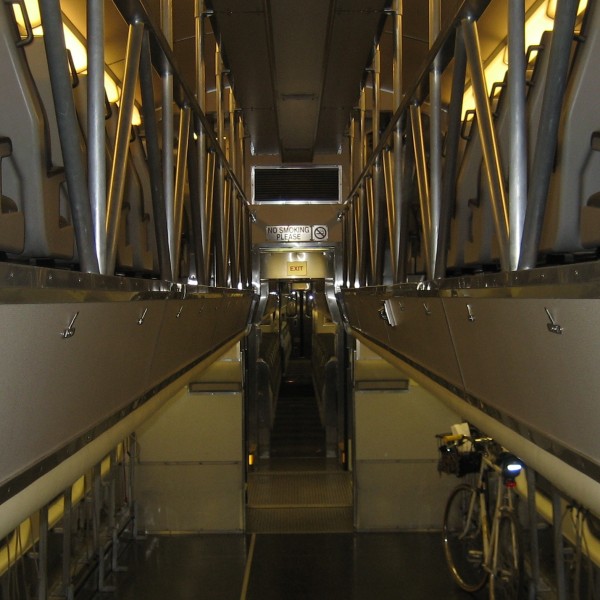
Looking down the aisle of an empty Caltrain
I love the double-decker Caltrain fleet, mostly because the older ones are the same type as the older Metra trains I sometimes got to ride as a kid. Too bad they swapped out the reversible seats: I guess they were too prone to smash fingers.
Today I boarded at San Jose Diridon (where the non-Gilroy Caltrains start their run towards San Francisco) and the doors were open a few cars down the aisle. In the quiet of a Sunday evening it felt kind of like an abandoned space craft from “2001.”
That is my bicycle on the right. I’m glad to see the reflector on the patch kit blinking back at the flash.
Feedback Welcome
Link:
https://dannyman.toldme.com/2011/01/28/atherton-fear-the-shadow/
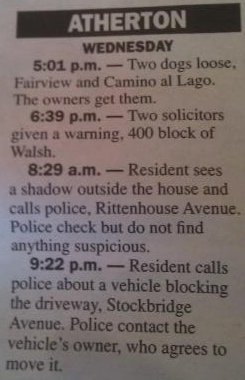
Beware the Shadow
Admittedly, not much of a photo. But here’s a shot from this morning’s local free paper. I always like to see what sort of petty crimes have made the Atherton Police Blotter. (Atherton is where we keep our rich people, sealed off in walled compounds.)
2 Comments
Link:
https://dannyman.toldme.com/2011/01/27/podcast-morning-commute/
A while back I purchased a Sony ICD-PX820 voice recorder for a different project I’ve been putting off. (Shame on me.) This morning as I was bicycling in to work I heard the pop-pop-pop of duck hunting. I stopped to take some pictures (photo a day?) and then noticed I had my voice recorder on me.
Listen, if you dare: morning-commute.mp3 (14m13s)
It starts out slow . . . just a test, but as it went along I started pausing recording and stringing together more overt narration. I then managed to trim out a little bit using Audacity. I enjoyed listening, but I am biased. It might be more fun to hear years from now: “Hello, younger Danny!”
Conclusions:
- The voice recorder is excellent. One less excuse to start interviewing folks.
- The voice recorder may also be helpful to “jot down ideas” hands-free.
- I thought WordPress had better “podcast” support built in. (Eh?)
- If I want to produce Audio, I should spend a little effort to learn Audacity.
Feedback Welcome
Link:
https://dannyman.toldme.com/2011/01/18/what-goes-down-goes-up/
The market has been doing well lately, but even I am surprised.

Back in March 2009 when things were looking their bleakest, I scratched together less-than-my-usual-amount of cash and bought shares in a market index. On that occasion, QQQQ (Nasdaq 100) at $28.17/share. Today I noticed that, at $57, that stock has more than doubled in value since I bought it.
Three things come to mind.
1) Yay me! (Though, I have seen plenty of my money evaporate in stocks, so I won’t get too smug.)
2) Warren Buffet’s advice, to “be greedy when others are scared, and scared when others are greedy.” Since people are getting greedy, I shouldn’t feel too bad selling stock at this height to cover wedding expenses.
3) My perpetual ambivalence about the stock market as a gambling parlor that doesn’t reflect true economic value, but is really a bunch of rascals trying to trick each other. The real value in our economy is in the workers and the planet, and the stock market on a good day is an ethically blind attempt to influence the direction in which the workers will direct their work.
Feedback Welcome
Link:
https://dannyman.toldme.com/2011/01/18/i-can-has-35-years/
Big thanks to Mei for baking a cake and hosting a party and putting up with me most days. Gratitude as well to friends who came by and made it a nice party last night.

The Birthday Cake
I had to open the patio door to help clear the smoke from the room. Next year I’ll ask for a fire extinguisher for Christmas.
1 Comment
Link:
https://dannyman.toldme.com/2011/01/12/tired/
I was up ’til 1am working on some diagrams to help illustrate a book. At 5:30am the cat started jumping on us for breakfast. That’s not right, so I expressed my disapproval and locked her out of the bedroom.
But I had to hop out of bed and engage her a few more times with the spray bottle before she stopped trying to dig through the door.
Then she started crying. And I worried that maybe the neighbors might complain.
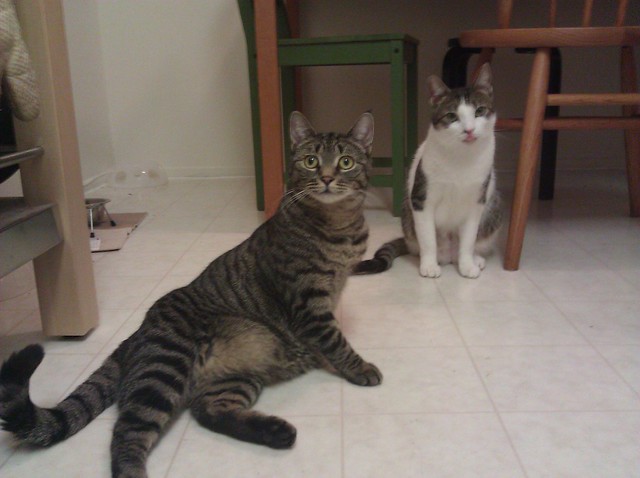
I’m sure kids are worse.
Feedback Welcome
Link:
https://dannyman.toldme.com/2011/01/11/missing/
I have that uneasy feeling that I am forgetting something. I guess it may have something to do with the fact that after having resigned herself to my loyalty to my beat up old round-the-world college backpack, Mei had me empty it so she could take it in for repairs as a birthday present. Subtract that missing element from the new apartment I’m still unpacking in to after the holidays . . .
Or its that yesterday I spent some time at the hospital visiting a friend from older days, hanging out with his folks and keeping them company while their son, my age, drifted in and out of sleeping off the stroke he had on Friday. I remember the time spent in Colorado when it was Dad’s turn to shake off his own stroke.
And then there’s the Congressman shot clear through her left lobe. I listen attentively when they explain that, as with my friend and with my father, the left is where language is. One question is whether there is motor control in the right hand, since the hand is controlled next door from language.
I worry about my friend, but I know he will be okay, one way or another. One way he won’t be able to work, and may even need some personal assistance. Another way is that between his youth, spirit, and clean living, he will rehabilitate so well that years from now he will have difficulty convincing people who hadn’t seen it that he had once had a stroke.
Only time will tell. For now his folks are taking turns sleeping in the reclining chair next to his bed in the critical care. The son is there to rest and cooperate with the Doctors. The parents are there because there really is nowhere else in the world they can be right now. They attend to the details of managing their son’s life and care while he is down. I worry more about them, because I have some idea of where they are, and their needs can be better understood without a medical degree.
That may be it. I feel like I am missing something because instead of the hospital I am headed to the office. I would rather wait around at the hospital. Fortunately my friend and his family are inundated by visitors, and dropping by for a while in the evening after work, I won’t be in the way.
Feedback Welcome
« Newer Stuff . . . Older Stuff »
Site Archive












